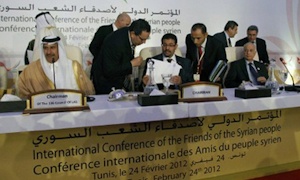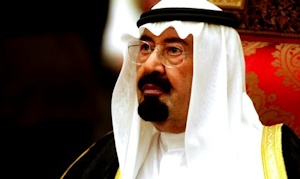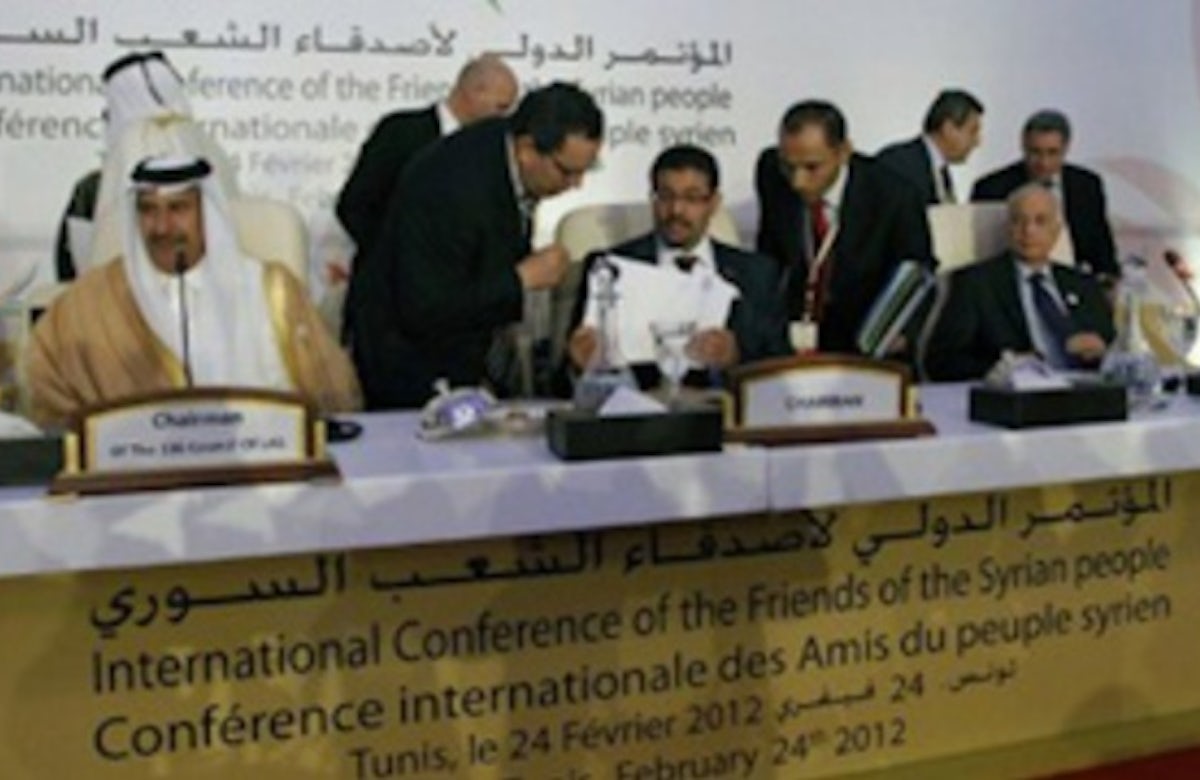By Pinhas Inbari
 Over the weekend, Tunisia hosted a conference of the 'Friends of the Syrian People' group in Tunis. The conference came at a time of major disagreements within the international community and the Arab world about the proposed reaction to the atrocities committed by President Assad’s regime. The conference did not bear fruit. It did not issue a final communiqué and saw the Saudi Arabian delegation walk out before the official conclusion of the event.
Over the weekend, Tunisia hosted a conference of the 'Friends of the Syrian People' group in Tunis. The conference came at a time of major disagreements within the international community and the Arab world about the proposed reaction to the atrocities committed by President Assad’s regime. The conference did not bear fruit. It did not issue a final communiqué and saw the Saudi Arabian delegation walk out before the official conclusion of the event.
Russia and China have extended unshakable support to Assad's regime and did not participate in the conference. The two countries’ motivation was clear. US Secretary of State Hilary Clinton expressed confidence in the main Syrian opposition body, the Syrian National Council (SNC), which is based in Turkey and has already successfully mobilized enough legitimacy and support. The United States would like to see the SNC become the alternative legitimate government of Syria after the deposal of the Assad. Russia and China, however, would rather find a solution to the Syrian problem within the framework of the current regime.
While there exists a large international consensus – with the exception of Russia and China – that President Assad should step down, there is no consensus about the role of the SNC. Most Arab governments are suspicious of the nature of SNC and are hesitant to trigger the downfall of Assad’s regime as long as the SNC is the leading alternative.
 The uneasiness about the SNC felt by regional players like Saudi Arabia was apparent in a recent speech by the Saudi King Abdullah (pictured) who said that "whatever happens in the Arab world is targeting Islam and the Arabs". With the Muslim Brotherhood on the rise in Egypt and elsewhere in the region, it is curious that the conservative king would worry about Islam becoming a target. His speech was in fact an answer to the Salafist government in Saudi Arabia, which does not see the Muslim Brothers as true Muslims but rather as a threat to Islam.
The uneasiness about the SNC felt by regional players like Saudi Arabia was apparent in a recent speech by the Saudi King Abdullah (pictured) who said that "whatever happens in the Arab world is targeting Islam and the Arabs". With the Muslim Brotherhood on the rise in Egypt and elsewhere in the region, it is curious that the conservative king would worry about Islam becoming a target. His speech was in fact an answer to the Salafist government in Saudi Arabia, which does not see the Muslim Brothers as true Muslims but rather as a threat to Islam.
Abdullah’s mention of the targeting of Arabs referred to the growing influence of non-Arab regional players like Turkey and Iran. The combination of the rise of the Muslim Brotherhood and that of Turkey and Iran, as seen in Syria, is an unacceptable development for Saudi Arabia.
The reasons for the Arabs’ mistrust of the SNC became apparent at last month’s Manama security conference. Dubai’s chief of security, Dhahi Khalfan, who became famous by 'exposing' the Mossad operation allegedly responsible for the assassination of Hamas leader Mahmoud al-Mabhuh, said that "the USA has no friends here" and that "the Muslim Brotherhood is no less dangerous than Iran."
The SNC is received financial backing from the government in Ankara. As such, it is directly influenced by the Muslim Brotherhood. The Arab governments are not interested in replacing Assad’s criminal regime by that of the Muslim Brotherhood, which would expand Turkey’s influence in the heart of Arabian lands.
Another indication of the real Saudi priorities can be found in the behavior of the Lebanese Druze leader Walid Jumblat, who, upon returning from a visit to Riyadh, immediately launched his first anti-Assad demonstration. Saudi Arabia, who emerged as the leading power in the Arab world following the upheaval in Egypt, seeks to regulate the role of minorities in the Levant instead of unifying the Arab world under the rule of the Muslim Brotherhood. Consequently, the Saudis, supported by the Gulf States, find themselves confronting the United States, who would prefer to see a unified Syria under the rule of the Muslim Brotherhood and the influence of Turkey.






